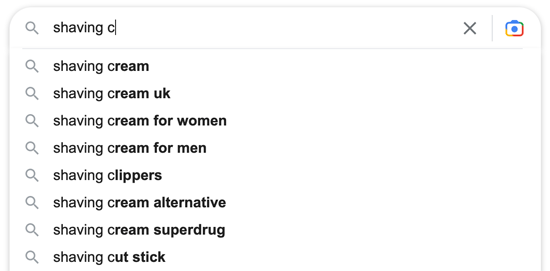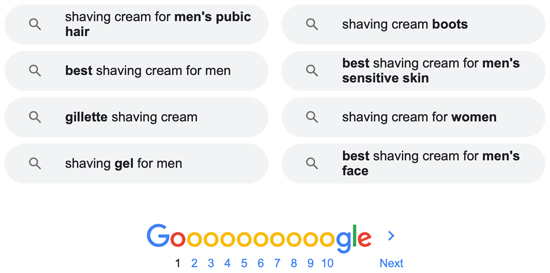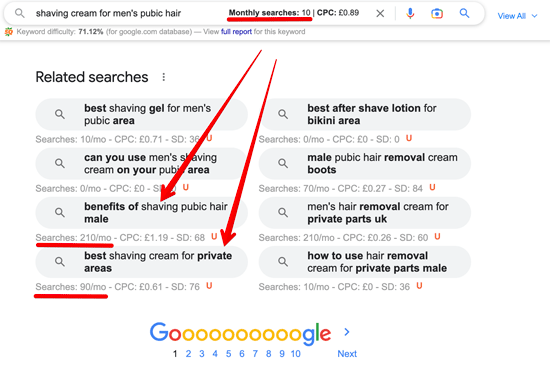If you’ve been involved in SEO for even a short while, you’ve probably heard of LSI keywords. What are they? Do you really need them? How do we find them and how do we use them in content?
Website content creation is becoming ridiculously competitive. You want to do anything to get ahead of the game, don’t you? Then whether LSI or not LSI, let’s just find out how to make the most of those keyword techniques and rank higher.

What Are LSI Keywords?
LSI (Latent Semantic Indexing) keywords are those that are semantically related to your main keyword. They are not synonyms but words that are related to the topic of the content. In SEO, Google specifically says that the algorithm does not take LSI keywords into consideration. But LSI keywords can help refine the content, so it will find more targeted users via search engines.
For example, if your main keyphrase is “shaving cream for men”, then LSI keywords can be, “sensitive skin”, “Gillette”, “barber”, “razor burn”, and so on.
Plus, if your LSI keywords include “discount”, “Amazon”, etc., it suggests that the content advises where to get the best/cheapest shaving cream for men.
Does an LSI Keyword Generator Help?
Yes, I think it does help if you’re like me, forget a specific expression while you’re writing all of a sudden and just cannot get that out in your head. When you shave, you get skin irritation…a rash on your skin…what was it called? An LSI keyword generator will tell you - it’s a razor “burn”.
Try a free generator tool such as keysearch.co, and see if you find it useful.
Any Other Ways To Find LSI Keywords? (Examples)
Whether you exactly call them “LSI keywords” or not, there’s something you can do to enrich your existing content or create an extra piece of content.
Use Google's Autocomplete Prediction and Related Search features.
1. Autocomplete Prediction
As soon as you start entering your seed keyword into Google, the dropdown list will come up with the rest of the most searched phrases. Make a note of all the ones that are semi-related to your target content, and either;
- Add it to your existing blog post, or
- Create a new post.
For example, I'm already writing or planning to write about shaving creams for men. If I type in "shaving c..." in Google, one of the autocomplete suggestions is "shaving cream alternative".

This gives me an extra idea - I can either;
- Add a section for shaving cream alternatives for men, or
- Create a new blog post titled "Shaving Cream Alternatives For Men".
2. Related Searches
Likewise, if I google "shaving cream for men" and scroll the page right down, I'll find a list of other keyword suggestions.

One of them is "shaving cream for men's pubic hair", which is not something I wasn't thinking about but men are looking for a solution and it perfectly makes sense. For this example, I would write a separate blog post because the target audience is different (i.e. men who are specifically looking to shave their pubic hair, not interested in shaving facial hair at the point.)
3. Further Searches
Now, if I check the keywords further using Neil Patel's Ubersuggest keyword tool;
"Shaving cream for men's pubic hair"
Only 10 people search the term per month.
"Best shaving cream for private areas"
The number of monthly searches: 90. Note this is genderless, as the phrase doesn't specify "men" or "male".
"Benefits of shaving pubic hair male"
The number of monthly searches: 210. It means a greater number of people search to see why men should shave their pubic hair.
From these findings, I could probably write about the best shaving cream brands for pubic hair, but include;
- A section that discusses the benefits, using the LCI keywords "benefits of shaving pubic hair for males" and
- Also the LIC phrase "private areas".
What I can take away from this exercise is that the related searches are time savers.
I only came up with "shaving cream" for example purposes, didn't I? All of a sudden I learned about people who were searching for pubic hair rather than facial hair. Then I almost instantly learned that more people were searching for benefits. It's given me some extra topic ideas in a short time, rather than coming up with them myself.
Can The Use of LSI Keywords Help You Rank Better?
Google says no, so not directly. But indirectly, as you can see from the examples above, yes. Unless you are a prolific writer, LSI keywords can help you generate more ideas and extend the content, hence adding more vocabulary and bringing up the value. If This doesn’t rank your page better, what does?
LSI Keywords - Final Thoughts
So LSI keywords are a way of variations of your content topic, and possibly, you can use them to help improve your SERP ranking. Not only will including LIS keywords in your content add depth, but it will also help Google better understand the meaning of your article.
There are quite a few other free tools available online, which will help you get some extra inspiration. Try incorporating LSI keywords into your content and see how it can improve your site performance.
What Do You Advocate?

